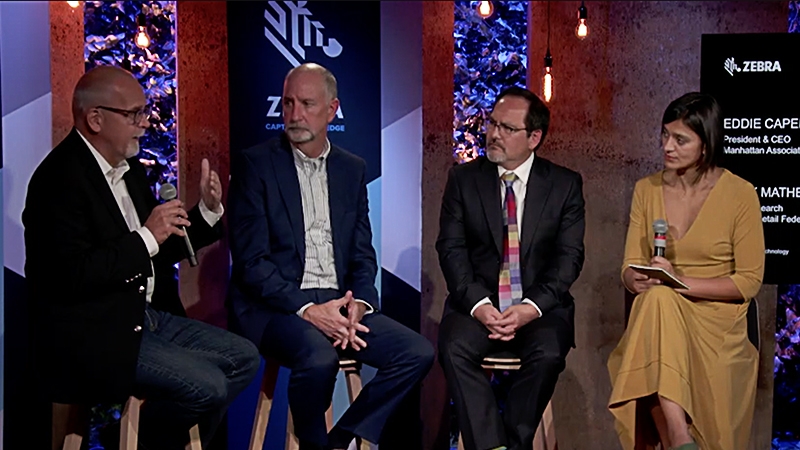Transform retail operations with Zebra’s retail technology solutions, featuring hardware and software for improving inventory management and empowering teams.
Streamline operations with Zebra’s healthcare technology solutions, featuring hardware and software to improve staff collaboration and optimize workflows.
Enhance processes with Zebra’s manufacturing technology solutions, featuring hardware and software for automation, data analysis, and factory connectivity.
Zebra’s transportation and logistics technology solutions feature hardware and software for enhancing route planning, visibility, and automating processes.
Learn how Zebra's public sector technology solutions empower state and local governments to improve efficiency with asset tracking and data capture devices.
Zebra's hospitality technology solutions equip your hotel and restaurant staff to deliver superior customer and guest service through inventory tracking and more.
Zebra's market-leading solutions and products improve customer satisfaction with a lower cost per interaction by keeping service representatives connected with colleagues, customers, management and the tools they use to satisfy customers across the supply chain.
Empower your field workers with purpose-driven mobile technology solutions to help them capture and share critical data in any environment.
Zebra's range of Banking technology solutions enables banks to minimize costs and to increase revenue throughout their branch network. Learn more.
Zebra's range of mobile computers equip your workforce with the devices they need from handhelds and tablets to wearables and vehicle-mounted computers.
Zebra's desktop, mobile, industrial, and portable printers for barcode labels, receipts, RFID tags and cards give you smarter ways to track and manage assets.
Zebra's 1D and 2D corded and cordless barcode scanners anticipate any scanning challenge in a variety of environments, whether retail, healthcare, T&L or manufacturing.
Zebra's extensive range of RAIN RFID readers, antennas, and printers give you consistent and accurate tracking.
Choose Zebra's reliable barcode, RFID and card supplies carefully selected to ensure high performance, print quality, durability and readability.
Zebra's location technologies provide real-time tracking for your organization to better manage and optimize your critical assets and create more efficient workflows.
Zebra's rugged tablets and 2-in-1 laptops are thin and lightweight, yet rugged to work wherever you do on familiar and easy-to-use Windows or Android OS.
With Zebra's family of fixed industrial scanners and machine vision technologies, you can tailor your solutions to your environment and applications.
Zebra’s line of kiosks can meet any self-service or digital signage need, from checking prices and stock on an in-aisle store kiosk to fully-featured kiosks that can be deployed on the wall, counter, desktop or floor in a retail store, hotel, airport check-in gate, physician’s office, local government office and more.
Adapt to market shifts, enhance worker productivity and secure long-term growth with AMRs. Deploy, redeploy and optimize autonomous mobile robots with ease.
Discover Zebra’s range of accessories from chargers, communication cables to cases to help you customize your mobile device for optimal efficiency.
Zebra's environmental sensors monitor temperature-sensitive products, offering data insights on environmental conditions across industry applications.
Enhance frontline operations with Zebra’s AI software solutions, which optimize workflows, streamline processes, and simplify tasks for improved business outcomes.
Zebra Workcloud, enterprise software solutions boost efficiency, cut costs, improve inventory management, simplify communication and optimize resources.
Keep labor costs low, your talent happy and your organization compliant. Create an agile operation that can navigate unexpected schedule changes and customer demand to drive sales, satisfy customers and improve your bottom line.
Drive successful enterprise collaboration with prioritized task notifications and improved communication capabilities for easier team collaboration.
Get full visibility of your inventory and automatically pinpoint leaks across all channels.
Reduce uncertainty when you anticipate market volatility. Predict, plan and stay agile to align inventory with shifting demand.
Drive down costs while driving up employee, security, and network performance with software designed to enhance Zebra's wireless infrastructure and mobile solutions.
Explore Zebra’s printer software to integrate, manage and monitor printers easily, maximizing IT resources and minimizing down time.
Make the most of every stage of your scanning journey from deployment to optimization. Zebra's barcode scanner software lets you keep devices current and adapt them to your business needs for a stronger ROI across the full lifecycle.
RFID development, demonstration and production software and utilities help you build and manage your RFID deployments more efficiently.
RFID development, demonstration and production software and utilities help you build and manage your RFID deployments more efficiently.
Zebra DNA is the industry’s broadest suite of enterprise software that delivers an ideal experience for all during the entire lifetime of every Zebra device.
Advance your digital transformation and execute your strategic plans with the help of the right location and tracking technology.
Boost warehouse and manufacturing operations with Symmetry, an AMR software for fleet management of Autonomous Mobile Robots and streamlined automation workflows.
The Zebra Aurora suite of machine vision software enables users to solve their track-and-trace, vision inspection and industrial automation needs.
Zebra Aurora Focus brings a new level of simplicity to controlling enterprise-wide manufacturing and logistics automation solutions. With this powerful interface, it’s easy to set up, deploy and run Zebra’s Fixed Industrial Scanners and Machine Vision Smart Cameras, eliminating the need for different tools and reducing training and deployment time.
Aurora Imaging Library™, formerly Matrox Imaging Library, machine-vision software development kit (SDK) has a deep collection of tools for image capture, processing, analysis, annotation, display, and archiving. Code-level customization starts here.
Aurora Design Assistant™, formerly Matrox Design Assistant, integrated development environment (IDE) is a flowchart-based platform for building machine vision applications, with templates to speed up development and bring solutions online quicker.
Designed for experienced programmers proficient in vision applications, Aurora Vision Library provides the same sophisticated functionality as our Aurora Vision Studio software but presented in programming language.
Aurora Vision Studio, an image processing software for machine & computer vision engineers, allows quick creation, integration & monitoring of powerful OEM vision applications.
Adding innovative tech is critical to your success, but it can be complex and disruptive. Professional Services help you accelerate adoption, and maximize productivity without affecting your workflows, business processes and finances.
Zebra's Managed Service delivers worry-free device management to ensure ultimate uptime for your Zebra Mobile Computers and Printers via dedicated experts.
Find ways you can contact Zebra Technologies’ Support, including Email and Chat, ask a technical question or initiate a Repair Request.
Zebra's Circular Economy Program helps you manage today’s challenges and plan for tomorrow with smart solutions that are good for your budget and the environment.
The Zebra Knowledge Center provides learning expertise that can be tailored to meet the specific needs of your environment.
Zebra has a wide variety of courses to train you and your staff, ranging from scheduled sessions to remote offerings as well as custom tailored to your specific needs.
Build your reputation with Zebra's certification offerings. Zebra offers a variety of options that can help you progress your career path forward.
Build your reputation with Zebra's certification offerings. Zebra offers a variety of options that can help you progress your career path forward.

#NextWave: What Retailers Must Do to Stay Relevant in the "Now Economy"
It wasn’t so long ago that manufacturers and retailers were the ones to dictate the manufacturing and retail models. Consumers would be given a date when they could expect a good they ordered to be delivered, and they patiently waited. Your catalog or online order might take a week or two for fulfillment. A special-order car may take a month or so to get from the factory to the dealership. And movies would be available for at-home viewing on VHS or DVD approximately 6-12 months after leaving the theater. You probably still shopped primarily in stores for groceries, clothes, and other items that may need to be returned. Then, something changed.
At first, we were over-the-moon that we could access, share and store all of our media files – videos, photos, music, books, and more – via digital methods. That we could see movies a month after they left theaters or, in the case of some streaming services, the day they left. Then Redbox replaced Blockbuster. And a tiny online bookstore began slowly expanding its offerings to feed off consumers’ increasing appetite for on-demand content. That “content” started including clothes, electronics, cleaning supplies and eventually cauliflower rice. Seven-day shipping for online orders turned into two-day shipping, then next-day shipping, then same-day shipping with a 2-hour delivery window. All of the sudden, anything that wasn’t accessible “right now” became inconvenient. That tiny online bookstore forced an entire industry to overhaul its transaction model to fulfill consumers’ new appetite for everything on-demand. (Ever notice that even fast food lines aren’t fast enough for many people? Or that convenience stores aren’t convenient enough? More on that to come in future posts.)
Indeed, Amazon caused eCommerce to “grow up” faster than anyone could have honestly predicted. It proved a new online transaction model that compelled consumers to demand “convenience” from all retailers small and large, regardless of whether the shopping experience occurs online or in a brick-and-mortar location.
As you will see in our video from the Zebra workshop panel discussion hosted at the TED World Theater, the rapid rise of the “now economy” has left retailers with two choices: adjust their omnichannel strategies to meet this new consumer standard (and revenue targets) or stay stagnant and risk stagnant sales. Unfortunately, many retailers face challenges in staying relevant while remaining cost effective, especially given their reliance on suppliers who are struggling themselves to keep up with manufacturing demand. That is why this conversation is so important.
Recode editor, Rani Molla engages Auburn Professor Brian Gibson, Manhattan Associates President and CEO Eddie Capel, and National Retail Federation Vice President of Research, Mark Mathews in a discussion on how retailers can reframe their business model to survive (and hopefully thrive in) the new “now economy.” They touch on topics such as retail delivery, the omnichannel, grocery shopping online and the future of shopping. They also offer recommendations on changes that retailers can make to deliver “convenience” without compromising quality or price competitiveness. Watch the video:

Tom Moore
Tom Moore brings over 30 years of experience in the retail and hospitality industries to Zebra. In his current role, he is responsible for positioning solutions to address key business problems for customers in the retail & hospitality industries. This includes keeping a pulse on trends, voice of the customer, partner strategies, driving revenue-based programs to support marketing, sales, and product management initiatives. He also works to identify go-to-market solutions and collaboratively deliver these solutions to customers with Zebra sales, channels, and product groups. Mr. Moore is co-chair of the vendor advisory council for HTNG and a previous board member of the International Retail User Group. He is also a frequent speaker at industry, customer and partner events.
Prior to joining Zebra, Mr. Moore held management positions in sales, alliances, channel programs and product marketing at companies such as Symbol Technologies, Motorola Solutions and NCR Corporation. He has traveled extensively in North America, Latin America, Europe and Asia and has worked closely with numerous customers on the value of store automation, operational efficiencies and mobility solutions.
Mr. Moore holds a Bachelor of Science from Kent State University, lives in Atlanta, GA, has four grown children (all girls). He enjoys playing golf and boating in his free time.
Zebra Developer Blog
Zebra Developer BlogZebra Developer Blog
Are you a Zebra Developer? Find more technical discussions on our Developer Portal blog.
Zebra Story Hub
Zebra Story HubZebra Story Hub
Looking for more expert insights? Visit the Zebra Story Hub for more interviews, news, and industry trend analysis.
Search the Blog
Search the BlogSearch the Blog
Use the below link to search all of our blog posts.
Most Recent
Legal Terms of Use Privacy Policy Supply Chain Transparency
ZEBRA and the stylized Zebra head are trademarks of Zebra Technologies Corp., registered in many jurisdictions worldwide. All other trademarks are the property of their respective owners. ©2025 Zebra Technologies Corp. and/or its affiliates.






